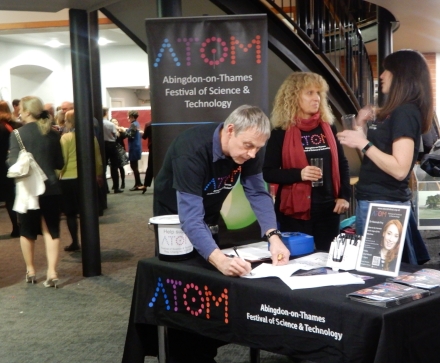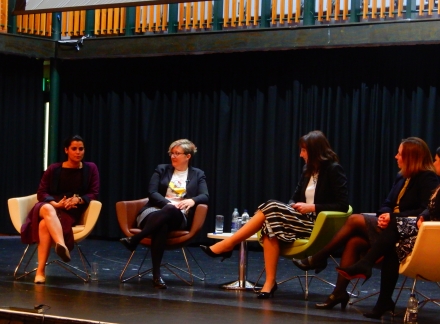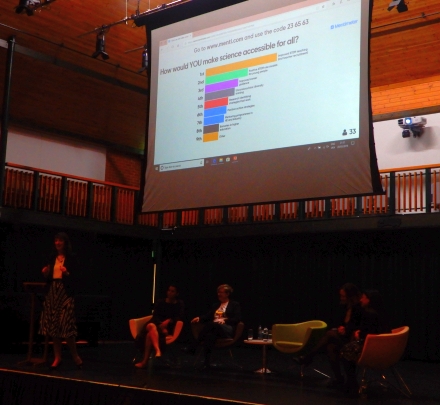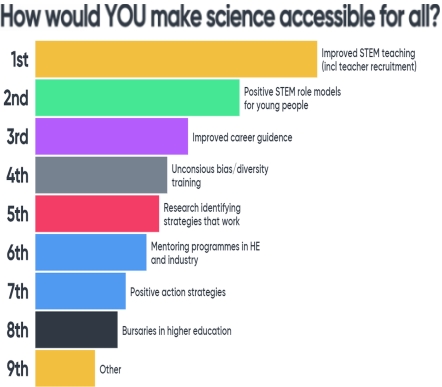
At St Helen and St Katherine School this evening there was a panel discussion at the start of the ATOM Festival – The Abingdon-on-Thames Festival of Science and Technology.

The question for the all female panel was ‘If you had $3m dollars how would you encourage more engagement in Science’. The speakers were: Shefali Sharma, Steph Hills (former student at St Helen and St Katherine), Dr Jess Hamer, Vicki Potter, and Dr Suze Kundu.
The speakers said how Science and Technology is very important in the modern world. And that diversity is important in a team working on science and technology. A wider range of minds help to find and solve the issues facing society.
Each speaker had a different way to spend the money. But it would be fair to say they all wanted to overcome physical access issues, and increase access to Science whatever people’s gender, ethnicity, and social background. Steph Hills said she would use the money to make all science facilities accessible. Having blown the $3m budget on that she suggested ways to encourage diversity for free.
It was recognised some people get put off doing Science. Top grades in Science and Maths at A Level is not the only way into a Science career. Apprenticeships with practical making and engineering skills can also lead people to work on important science programmes. One speaker mentioned conversion programmes to get people into Science who get interested in Science and Technology later in life.

After hearing all the discussion, members of the audience voted on their top priority for the $3m. (Science, Technology, Engineering and Mathematics has the acronym STEM). Here are the results:

Improved teaching came out top. Dr Jess Hamer said there is a shortage of Maths and Science teachers in the state schools. To remedy that she suggested ensuring teaching is more valued by society; it should be better paid; teachers should be allowed to teach their specialisms early on; and have more autonomy.
For a discussion about science, it’s a bit disappointing that finding out what actually works only comes in halfway down the list.
To be fair David, the discussion was very clear that this is a multi-faceted problem and in reality there is a place for all these activities in the solution.
I would certainly take issue with you though, if you dont think investing more in STEM teachers, providing stronger role models and i proving careers guidance (the discussion was talking about it happening younger) are things that do/can work. Personally I think there is a big place for all of these in addressing accessibility to careers in STEM.
Is “what actually works” engineering? Since my brother-in-law was a Professor of Mechanical Engineering at UCL, this is not meant to be a dig at engineering.
I certainly didn’t, and wouldn’t, say that any of those things don’t work, or aren’t worth doing. But there are many ways in which you could do each of those things.
I would think the starting point should be to invest in understanding which of those ways are most effective, or indeed if there are other interventions that would have more impact, rather than just spending money haphazardly. After all, wouldn’t that be the scientific approach?
Can you ever predict the outcomes of research? Even when outcomes emerge, there may be resistance to what research indicates (cigarettes and lung cancer, as an example).
How do we determine what will be most effective or have most impact?
Sometimes pure research may not yield “practical” results for ages (Stephen Hawkings and black holes). Does this make this work less important or valuable?
I don’t know whether there are cut and dried answers to thes questions, but I imagine that they are the sorts of questions that we need to answer if we want science to be of “practical” use.
Methodology is important, but different research projects require different methodologies. It all leaves me with splinters under the fingernails…
Fully agree David, and there is quite a bit of research in these areas already, but as Paul suggests, not necessarily conclusive, so there is an element of paying your $3m and making a choice.
One of the areas of the discussion I found interesting was a seeming paradox the panel touched on in passing.
The value of inclusivity (gender, race, physical ability, social background) is the desirability of a breadth of persepctive amd approaches it brings to solving a problem, developing a product, delivering a project, building a business etc.
The educational background that had supported 4 of the 5 (very impressive) female panelists to take up careers in STEM was single sex, academically selective and (I think they said) fee-paying. By definition that tends to screen out 2 of the 4 types of diversity from the education process they experienced.
I didnt reach any particular judgement on this but found it an interesting paradox.
Iain, I didn’t see it as a paradox. I have very mixed feelings about single sex schools, but have no doubt that they do reduce the pressure on students to conform to gender stereotypes.
The undoubted value of having people from diverse backgrounds in the workplace – or indeed in academic research teams – doesn’t mean that those people have to have individually been exposed to diversity in their formative years.
One of the stories that resonated most with me that evening was the one about the woman doing an admin job in a technology company who realised that she could – and would enjoy – doing what the shop floor people did. Getting people to realise that a career move into STEM at a later age is perfectly possible could be a great way to rapidly increase the number of role models in under-represented groups.
Meanwhile, for those of us who were not fortunate enough
to be born with a silver spoon in their mouth, its all about learning about what’s out there from inspirational teachers, it only takes one good teacher to ignite a spark, encourage a passion or install “the want” in our youngsters, sadly though it may be those “inspirationalists” have left, or may not even bother with state schools, choosing instead to seek higher pay in the private ones?
Yes Steve, the importance of inspirational teachers was agreed by all – and the need to find more of them and make their working environment better so we don’t lose them.
PS not all single-sex schools are fee-paying!